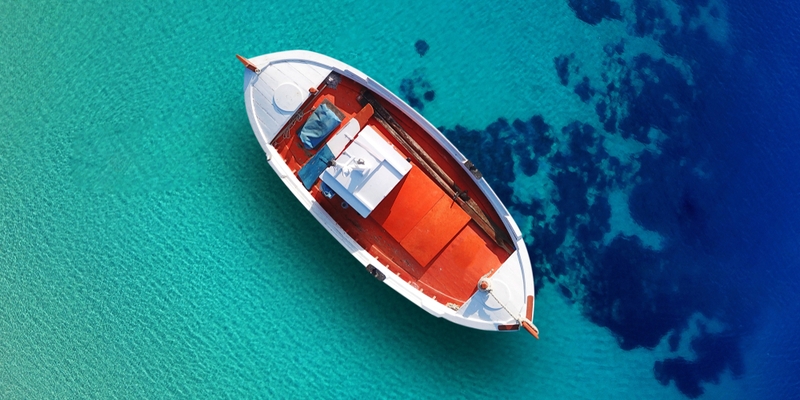
If you are not redirected within 30 seconds, please click here to continue.
Samedi: 10h – 16h HAE

If you are not redirected within 30 seconds, please click here to continue.
If you are not redirected within 30 seconds, please click here to continue.
This article has been updated from a previous version.
It’s safe to say that Canadians are fairly waterlogged. We’re surrounded by oceans on three sides, with thousands of lakes scattered across the country’s interior (563 of which are 100 square kilometres or larger), including the Great Lakes, which hold nearly 20% of the world’s supply of freshwater alone. All that adds up to a national passion for boating — and boat ownership.
But before you decide to dive into the yachting life, here are some more important facts you should be aware of.
The boat buyer’s guide
Boat show season starts early on in the year while the lakes are still frozen. One of the biggest, the Toronto International Boat Show is held in January, and features dozens of dealers selling boats large and small. Other shows — and boat showrooms — are scattered across any part of the country that’s close to water. At these shows, people can easily spend $10,000 on a 16-foot fishing boat or upwards of $100,000 on a 20- to 30-foot cottage runabout.
Once you get into sailboats and cruisers, that’s when bank accounts may be in trouble. Russian billionaire Roman Abramovich reportedly spent between the high millions to a billion dollars on his 553-foot-long superyacht, the Eclipse. Amenities on board his vessel include two helipads, a mini-submarine, 24 guest rooms, and a missile-defence system to keep everyone safe. Annual operating costs, including salaries for the crew of 70, are estimated at $75 million.
Sailing second hand
If the sticker shock on even a more moderate vessel is too much, as with a car, you can save money by buying used.
You can pick up a tin fishing boat with a small outboard motor for a couple thousand dollars (or less, if you’re willing to put in some elbow grease). Just make sure you do your research, so you don’t end up buying someone else’s floating lemon.
Sellers will often pay for a marine survey of their craft — the boat version of a home inspection — before they put it on the market. If not, you can find a certified marine surveyor of your own to inspect the boat for you. Whether you buy new or used, if you’re new to boating, your best move would be to first borrow or rent the type of boat you’re thinking of owning and try to arrange a test drive before you lay your money down on a particular boat.
Pit stops along the way
With small outboard engines, you can bring the tank with you to fill up at any gas station. But unless you plan on hauling your inboard-engine boat out of the water every time you fill up the tank, you’re at the mercy of the largely competition-free marinas’ rates.
As anyone who owns a home or car will tell you, owning assets is great, until something goes wrong. Boat ownership will require a variety of maintenance chores, from cleaning the hull to tuning the engine. Canada’s saltwater marine environments are particularly harsh on things like fuel line hoses. Budget 10% to 20% of the purchase price of a boat for annual maintenance.
Safety fees
To drive a boat in Canada, you need to have a Pleasure Craft Operator Card. There’s a $250 fine for not having one when behind the wheel of a boat.
To receive one, you have to pass a test confirming your understanding of how to safely operate a boat in Canada. You can do the test online for $50. In addition to having a properly sized life jacket for everyone on board your vessels, depending on the size and type of boat you’re operating, there is a list of additional safety gear you’re required to carry, including an oar, signal flares, and a safety line.
Winter storage can be costly
When boating season wraps up, you’re going to want to get your boats out of the water and stored. For a small runabout, the process may be as simple as loading it onto the trailer and hauling it home to your garage — or renting or borrowing space in someone else’s.
For larger cruisers and sailboats, you’ll want to contact a local marina about hauling out and storage fees. The Mimico Cruising Club, located where Toronto’s Humber River spills into Lake Ontario, for example, charges members $3.58 per square foot of boat. So, a 30’-long, 10’ wide cruiser costs about $1,000 to have stored and re-launched in the spring. Of course, that doesn’t include the first-year initiation and membership dues that tally up to more than $8,000.
Compare insurance rates
Lastly, there’s the insurance. Unlike car insurance, boating insurance isn’t mandatory in Ontario. But it has its benefits.
Just as a potential homeowner would compare mortgage rates and a driver renewing their policy would compare car insurance rates, it’s important to consider different insurance options for your boat. Coverage can provide the same protection you’d get from a car insurance policy, but for your boat. This includes protection against liabilities like property damage and bodily injury.
Some home insurance policies include coverage for a boat, depending on its cost and size. But you may need additional coverage for complete protection. And remember, your boating record can impact your driving record — and therefore the rate you pay for insurance. So be sure to drive smart behind the wheel of any vehicle.
Don't waste time calling around for auto insurance
Use RATESDOTCA to shop around, and compare multiple quotes at the same time.
Get money-saving tips in your inbox.
Stay on top of personal finance tips from our money experts!











